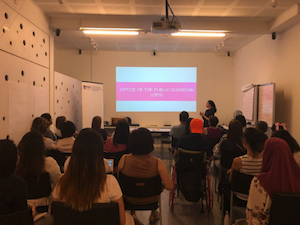-
Advocacy Theme
-
Tags
- Abortion
- Adoption
- Caregiving
- CEDAW
- Disability
- Domestic Violence
- Domestic Workers
- Harassment
- Healthcare
- Housing
- International/Regional Work
- Maintenance
- Media
- Migrant Spouses
- Migrant Workers
- Muslim Law
- National budget
- Parental Leave
- Parenthood
- Polygamy
- Population
- Race and religion
- Sexual Violence
- Sexuality Education
- Single Parents
- Social Support
- Sterilisation
- Women's Charter
Registering an LPA for you and your loved ones
August 20th, 2018 | Events, News, Older People and Caregiving
By Priya Narayan, AWARE intern
 As part of our ongoing efforts to continuously engage with the elderly and informal elderly caregivers in Singapore, AWARE invited the NUS Law Pro Bono Office to give a talk on the Lasting Power of Attorney (LPA), on 23 July.
As part of our ongoing efforts to continuously engage with the elderly and informal elderly caregivers in Singapore, AWARE invited the NUS Law Pro Bono Office to give a talk on the Lasting Power of Attorney (LPA), on 23 July.
The speakers were Isabella Tan and Gwendolyn Oh, undergraduate students at NUS Law, who were guided by NUS Law Professor Ruby Lee Yen Kee.
What is an LPA? It is a legal document that allows a donor to voluntarily appoint one or more donees to make decisions and act on their behalf should they lose the mental capacity to make their own decisions.
Mental capacity has to be assessed on a case-by-case basis and can formally be assessed only by a registered medical practitioner. The speakers went through some case studies to guide us on how to informally deem someone mentally incapacitated, how to make decisions on behalf of the donor, and what kind of decisions can be made by the donee(s). This is encapsulated in the principles of the Mental Capacity Act.
LPA ensures protection of certain rights and interests in the event one loses mental capacity. Furthermore, an LPA is particularly important because if someone without an LPA becomes mentally incapacitated, the procedure (deputyship) will be taken over by the court, which is much more expensive and impersonal. More information about the LPA can be found here on the OPG website.
There was a lengthy and engaging Q&A session, in which many of the participants shared their experiences and concerns.
A key point of concern amongst the audience members was how the LPA is linked to the will. The LPA is a legal document and has effect till one’s death, at which point, the will becomes the prominent legal document. Some were concerned that because donees and beneficiaries of the will tend to overlap, donees might fail to act in the best interest of the donor and skimp out on providing the donor with decent care and comfort, in order to save up and receive a larger share of the will.
The LPA might be a rather tricky legal document, and therefore it is important to think through it carefully. Professor Lee reminded all of us that the LPA can be amended at any point and as many times as required, and though there might be a fee, these are small charges that could secure a better old age.
The biggest takeaway from this talk would be to be very careful when choosing donees, and to choose only those who can be trusted deeply.
It also has to be noted that the LPA is completely separate from the will, and thus even with an LPA, a will has to be made as well, and vice versa.
The LPA is also useful for primary caregivers of elderly relatives, who would need this key legal document if the elderly relative they are caring for becomes mentally incapacitated. For example, the LPA will allow trusted donees to access the donor’s finances that can be used to provide better care for the donor when he/ she becomes mentally incapacitated.



